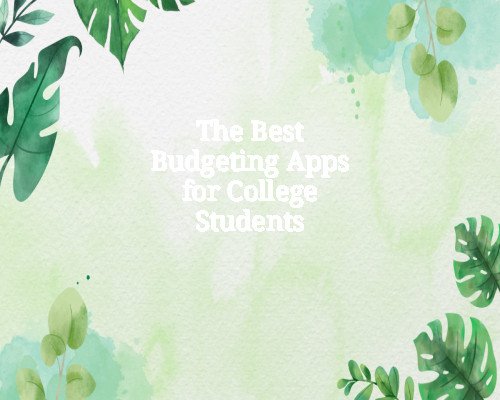The Best Budgeting Apps for College Students
Manage your money in college with ease—these budgeting apps help students track spending, save smarter, and avoid debt without added stress.
Why Budgeting Matters for College Students
College is often the first time students manage their own money. With limited income, rising tuition, and increasing living expenses, financial stress can mount quickly. Budgeting isn’t just a helpful tool—it’s essential for staying afloat, avoiding debt, and building smart money habits early on.
Budgeting apps simplify this process. Instead of manually tracking every dollar, these apps automate expenses, categorize spending, and give students real-time insights into their financial health. Whether you’re looking to avoid overdrafts or save for spring break, the right budgeting app can make all the difference.
Key Features to Look for in a Budgeting App
Before diving into the best apps available, it’s important to know what features matter most to college students:
-
Free or low-cost plans
-
Simple user interface
-
Bank synchronization
-
Custom budget categories
-
Spending alerts and notifications
-
Savings goals tracking
-
Credit score monitoring (optional)
Let’s explore the top budgeting apps tailored specifically to meet the needs of college students.
1. Mint: Best Overall for Budget Beginners
Mint is a pioneer in the budgeting app world and remains one of the best for students. It’s completely free and integrates with most U.S. banks, making it easy to track all your accounts in one place.
Key Features:
-
Automatic transaction categorization
-
Bill payment reminders
-
Credit score monitoring
-
Budget goal setting
-
Easy-to-understand visual graphs
Why It Works for Students:
Mint’s simplicity is perfect for beginners. It requires minimal setup and gives you a clear overview of where your money is going. Plus, the ability to set budget goals and alerts can help students avoid overspending.
2. Goodbudget: Best for Manual Tracking
Goodbudget uses the envelope budgeting method, which is ideal for students who want more control over their spending without linking to a bank account.
Key Features:
-
Manual expense tracking
-
Envelopes for different spending categories
-
Sync across devices
-
Historical spending reports
Why It Works for Students:
For students who prefer to be more hands-on, Goodbudget is a great way to learn discipline and intentional spending. It encourages conscious decision-making, which is key to financial growth.
3. YNAB (You Need A Budget): Best for Serious Budgeters
YNAB isn’t free, but it offers a 12-month free trial for college students, making it a valuable investment in financial literacy.
Key Features:
-
Zero-based budgeting
-
Real-time expense syncing
-
Goal tracking and forecasting
-
Comprehensive financial reports
-
Educational resources and workshops
Why It Works for Students:
YNAB teaches budgeting as a life skill. It helps students understand the value of every dollar and prioritize their spending. The platform also provides tons of tutorials and webinars for support.
4. PocketGuard: Best for Avoiding Overspending
PocketGuard is excellent for students who tend to overspend or want a no-frills tool that does all the tracking for them.
Key Features:
-
“In My Pocket” feature shows what’s safe to spend
-
Tracks bills and recurring payments
-
Spending limits and alerts
-
Syncs with multiple bank accounts
Why It Works for Students:
The app tells you exactly how much disposable income you have after your bills and goals are accounted for. It’s simple, visual, and perfect for students who don’t want to get bogged down with too many details.
5. EveryDollar: Best for Zero-Based Budgeting
Created by financial expert Dave Ramsey, EveryDollar is built around zero-based budgeting—assigning every dollar a job.
Key Features:
-
Monthly budget planning
-
Manual or automated tracking (with paid version)
-
Custom spending categories
-
Easy drag-and-drop interface
Why It Works for Students:
EveryDollar is especially helpful for students who want to ensure their spending aligns with their goals. Even the free version allows you to stay in control without syncing bank accounts.
6. Fudget: Best for Simplicity
Fudget stands out with its ultra-simple interface. It doesn’t categorize expenses or sync with banks, making it ideal for those who want minimal features.
Key Features:
-
Manual income and expense entry
-
Customizable lists
-
No ads in the premium version (one-time purchase)
-
Quick setup and use
Why It Works for Students:
Fudget’s no-frills approach is perfect for students who just want a digital notepad to track income and spending without distractions.
7. Wally: Best for International Students
Wally is an intuitive app with support for multiple currencies, making it ideal for international students managing finances in a new country.
Key Features:
-
Manual and automatic tracking
-
Currency conversion support
-
Custom budget and savings goals
-
Receipt scanning
Why It Works for Students:
International students often face unique budgeting challenges. Wally’s currency features and intuitive design help them manage finances easily across countries and bank accounts.
8. Zeta: Best for Couples or Roommates
Zeta is designed for shared budgeting, ideal for students who split expenses with roommates or partners.
Key Features:
-
Joint and individual budgets
-
Shared bills and goals
-
Chat feature for money discussions
-
Spending insights
Why It Works for Students:
College students often split rent, groceries, and utilities. Zeta makes it easy to track who owes what and keep shared expenses transparent.
How to Choose the Right Budgeting App
The best app for you depends on your personal habits, financial goals, and tech preferences. Here’s a breakdown to help you choose:
| Need | Best App |
|---|---|
| Automatic tracking | Mint, PocketGuard |
| Manual control | Goodbudget, Fudget |
| Shared budgeting | Zeta |
| Zero-based budgeting | YNAB, EveryDollar |
| Financial education | YNAB |
| Simplicity | Fudget |
| International use | Wally |
Tips to Make the Most of Your Budgeting App
Downloading an app is only the first step. To get real value from these tools, try the following:
-
Check the app daily: Make budgeting a habit.
-
Update your goals monthly: Adjust based on tuition, new jobs, or semester changes.
-
Use alerts wisely: Let them remind you—not annoy you.
-
Track subscriptions: Don’t let forgotten streaming or gym services eat into your budget.
-
Celebrate small wins: Sticking to your food or entertainment budget for the month is worth a small treat!
Final Thoughts
College is a crucial time to establish solid financial habits, and budgeting apps can be your best ally. Whether you want to simply track your spending or dive deep into goal setting and financial planning, there’s a perfect app for every student lifestyle. Start today, and let these tools guide you to financial independence one budget at a time.

